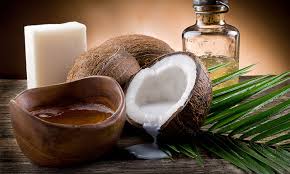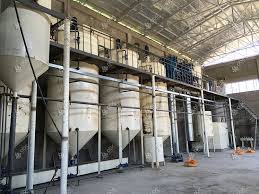![]()
If you’ve landed on this article page, you’re probably searching for a
good business idea—an idea that’s light on the pocket but heavy on
returns, promising both a fulfilling journey and potential profit.
|
How To Start A Lucrative Coconut Oil Production Business In
Nigeria
Coconut oil is a vegetable oil extracted from the kernels or
meat of mature coconuts. The scientific name for coconut is
Cocos nucifera. Coconut oil is a popular ingredient in cooking,
skincare, and hair care products due to its high saturated fat
content and unique nutritional and medicinal properties. It is
commonly produced through traditional methods of pressing or
centrifugation. Coconut oil farming is an important agricultural
activity in many tropical regions, including Nigeria and Africa.
With the right investment and policies in place, Nigeria has the
potential to become a major exporter of coconut oil to the rest
of the world. The country has an advantage in terms of climate
and soil conditions, which are ideal for coconut cultivation.
Additionally, the rising global demand for organic and natural
products presents an opportunity for Nigeria to position itself
as a leading producer and exporter of high-quality coconut oil.
The production process involves several stages, including
shelling, paring, grinding, drying, and pressing. The extracted
oil can be further processed to produce refined or virgin
coconut oil, which can then be packaged for sale. The increasing
demand for coconut oil in the global market provides an
excellent opportunity for countries like Nigeria to increase
their coconut oil production and exports.
Coconut oil production in Nigeria and Africa presents several
business opportunities. Here are ten opportunities to consider:
Coconut oil production: The first and obvious business
opportunity is producing coconut oil for sale. With the
increasing demand for coconut oil globally, there is a ready
market for the product in Nigeria and Africa.
Coconut processing machinery sales: Manufacturing and selling
coconut processing machinery is a lucrative business
opportunity. The high demand for coconut oil and other coconut
products such as coconut milk and desiccated coconut creates a
market for machinery that can efficiently process coconuts.
Coconut export business: Nigeria and Africa are endowed with an
abundant supply of coconuts, and coconut oil is in high demand
globally. There is a huge export market for coconut oil, and
establishing an export business is an excellent opportunity.
Coconut farming: Coconut farming is an opportunity for those
with arable land. Coconuts are a perennial crop and can provide
a sustainable source of income for farmers.
Coconut-based products manufacturing: There are several other
products that can be derived from coconuts, such as coconut
milk, coconut flour, and coconut water. Manufacturing and
selling these products present a business opportunity.
Organic coconut oil production: The demand for organic coconut
oil is increasing globally. There is an opportunity to produce
organic coconut oil and target the health-conscious segment of
the market.
Coconut-based beauty products: Coconuts are rich in nutrients
that are beneficial for the skin and hair. Manufacturing and
selling coconut-based beauty products such as lotions, shampoos,
and conditioners can be a profitable business.
Coconut-based food products: Coconut oil is a popular ingredient
in cooking and baking, and there is a growing demand for
coconut-based food products. Manufacturing and selling these
products present a lucrative business opportunity.
Coconut oil packaging: Proper packaging is essential in the
coconut oil business. There is an opportunity to manufacture and
sell coconut oil packaging materials, such as bottles, jars, and
containers.
Coconut waste management: Coconut processing generates waste
that can be harmful to the environment. There is a business
opportunity in providing waste management services for coconut
processing plants.
Coconut oil production businesses in Nigeria and Africa can be
categorized based on the method of production and the type of
coconut oil produced. Below are some types of coconut oil
production businesses in Nigeria and Africa:
Cold Pressed Coconut Oil Production: This method of production
involves extracting coconut oil without applying heat. The
method is considered healthier and the oil produced is of high
quality.
Refined Coconut Oil Production: This involves the use of
chemicals and heat in the extraction process. The oil produced
is usually clear and odorless, making it ideal for cosmetic and
cooking applications.
Organic Coconut Oil Production: Organic coconut oil production
is the process of producing coconut oil without the use of
synthetic fertilizers, pesticides, or other harmful chemicals.
This method is considered environmentally friendly and the oil
produced is of high quality.
Virgin Coconut Oil Production: Virgin coconut oil is produced
from fresh coconut meat, without undergoing any chemical
processing. The oil is considered pure and has a distinctive
flavor and aroma.
Fractionated Coconut Oil Production: Fractionated coconut oil is
produced by separating the fatty acids from the oil. The
resulting oil is clear, odorless, and has a longer shelf life.
Handmade Coconut Oil Production: This method involves the manual
extraction of coconut oil. The oil produced is usually of high
quality and considered pure.
Each type of coconut oil production business has its advantages
and disadvantages, and entrepreneurs in Nigeria and Africa can
choose the one that best suits their interests and resources.
Find a location: Choose a suitable location that is easily
accessible to raw materials and transportation.
Purchase equipment: Purchase equipment necessary for coconut oil
production, such as crushing machines, grinders, and filtering
equipment.
Source raw materials: Source high-quality coconuts from local
farmers or coconut plantations.
Extract the coconut oil: Extract coconut oil from the coconut
meat using the crushing and filtering equipment.
Package the coconut oil: Package the coconut oil in bottles,
jars, or other containers for sale.
Market your product: Develop marketing strategies to promote
your product and reach your target market. Utilize social media,
advertising, and other promotional tactics to build brand
awareness and increase sales.
Here is a step-by-step guide on how to produce, manufacture, and
package coconut oil in Nigeria
Source for coconuts: The first step is to source for fresh
mature coconuts from local farmers or markets.
Husking and Shelling: Remove the husk from the coconut by using
a machete or a coconut peeler. Crack the shell with a hammer or
a coconut cracker to extract the coconut flesh.
Grating: Grate the coconut flesh using a mechanical grater or a
manual grater. This process helps to break the coconut flesh
into smaller pieces.
Drying: Dry the grated coconut in the sun or an oven to remove
excess moisture content. Ensure that the moisture content is
reduced to about 10%.
Extraction: Extract the coconut oil from the dried grated
coconut using a mechanical press or expeller. This process helps
to separate the oil from the flesh.
Filtering: Filter the extracted coconut oil using a muslin cloth
or a filter press to remove impurities.
Settling: Allow the filtered coconut oil to settle for about 24
hours to separate any water and sediments from the oil.
Bottling and Packaging: After the oil has settled, carefully
pour the oil into a clean, dry container or bottle, seal it
tightly, and label it appropriately.
Distribution: Distribute the packaged coconut oil to local
markets or supermarkets.
Marketing: Create a marketing plan to promote your coconut oil
brand, such as advertising in local newspapers or online
platforms.
Coconut oil production is a viable business opportunity in
Nigeria and Africa, considering the abundance of coconut trees
and the growing global demand for coconut products. With the
right approach and investment, entrepreneurs can leverage this
opportunity to create profitable ventures, stimulate economic
growth, and contribute to poverty reduction. However, it is
important to note that coconut oil production is not without its
challenges, which range from high competition to fluctuating
market prices and inadequate infrastructure. Entrepreneurs need
to be aware of these challenges and have solid business plans in
place to mitigate them. Additionally, there are different types
of coconut oil production businesses, each with its unique
approach and equipment requirement.
Get our training guide, this guide reveals key insights on profitability in setting up your Coconut Oil Production Business, you will learn the step-by-step guide to starting your own business, and tips on how to succeed. Most especially, you will learn the exact costs of the materials and equipment you need for your Coconut Oil Production Business. The body of this work is formed from consulting experienced and relevant people running the Coconut Oil Production Business to get first-hand information about the success secrets and marketing strategies deployed to achieve business success.
|







